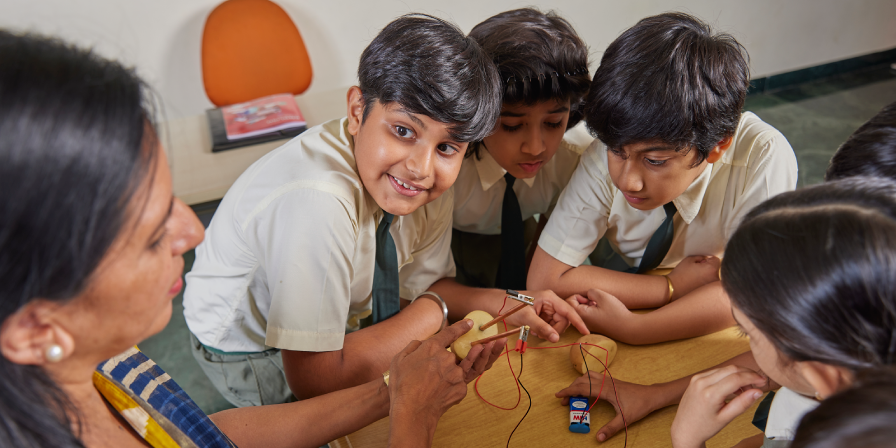The Impact of NCF (National Curriculum Framework) on Learning Outcomes

The Impact of NCF (National Curriculum Framework) on Learning Outcomes
Last Updated On: 22/05/2023
Siddharth Saxena
School Owner

“If we teach today as we taught yesterday, we rob our children of tomorrow.” – John Dewey
How Is the National Curriculum Framework Impacting Education In India?
The impact of the National Curriculum Framework (NCF) on India’s education system is quite significant as it sets a national standard for achieving quality education across all states. At the launch of the Mandate Document, the Hon’ble Union Minister for Education noted that the NEP 2020 provides the guiding philosophy, while the NCF is the pathway, and the mandate is the constitution.
One of the key aspects of the NCF 2022 is its encouragement of cultural exchange and cross-cultural learning through field trips, museum visits, and other activities. It recognises the importance of providing diverse learning experiences and interactions for students from different backgrounds and cultures.
The NCF emphasises the integrated understanding of science, mathematics, technology, and social sciences to foster critical thinking and problem-solving skills in students. It recommends challenging tasks that require students to apply scientific concepts in real-life situations.
It also focuses on holistic development and multi-disciplinary education, advocating for teaching in the mother tongue, continuous professional development for teachers, and life-long learning. The curriculum further aims to address the learning losses caused by the pandemic and pave the way for transformative, holistic, and integrated reforms across the Indian education ecosystem.
The NCF provides a more balanced learning experience encouraging curiosity, exploration, and inquiry. It prioritises stress-free learning and proposes Edtech as an enabler to create a more engaging curriculum. The empowering of teachers with the necessary skills, knowledge, and tools is also crucial, as they are a critical pillar of the NCF 2022.
In this article

National Curriculum Framework Outcomes

How Is LEAD Making Your School NCF Oriented?
National Curriculum Framework Outcomes
The NCF aims to build a curriculum framework for the foundational stage, including the goals of NEP 2020, taking into account the extensive global research on Early Childhood Care and Education (ECCE), leveraging the rich ECCE traditions of India, and developing the recent initiatives such as NIPUN Bharat and Vidya Pradesh, in order to proffer early childhood care and learning ecosystem for children.
The impact of NCF emphasises the importance of ‘play’ at the core of the operational, conceptual, and transactional approaches to pedagogy, curriculum organisation, time and content organisation, and the child’s overall experience. Along with this, the followings are the significant impact of National Curriculum Framework on learning outcomes:
- Upgrading Indian School System
NCF is favourably altering the Indian school system as envisioned in NEP 2020 through the right beneficial adjustments in the curriculum, including pedagogy.
- Reforming the Curriculum
As the word “curriculum” encompasses a student’s entire experiences in school, “practices” relate to curricular content and pedagogy and incorporate school environment and culture. The impact of NCF has improved practices in education rather than just ideas. In a nutshell, it has significantly improved students’ overall learning experiences through this comprehensive curriculum reform.
- Aiming Realistic Changes
Despite being based on the most recent research in early childhood care & education, NCF learning outcomes aims to be realistic, relatable, understandable, and usable by practitioners of education, including teachers, school leaders, and system functionaries.
- Making Teachers the Focal Point
Teachers are the focal point of NCF because they are the ones who actually carry out the practices of education. Therefore, everyone—including curriculum and content developers, administrators, textbook authors, and others—must adopt the teacher’s viewpoint.
- Promoting Innovation
The impact of NCF enhances the creativity of the institutions when provided with the best resources. Hence, NCF seeks to be aspirational & firmly grounded in our context’s realities.
Never miss a story
Stay updated with the latest news and articles related to school education
GIVE YOUR SCHOOL THE LEAD ADVANTAGE
How is LEAD Making Your School NCF Oriented?
The NCF 2022 is one of the significant components of NEP 2020 that enables this transformation, informed by the principles, aims, and approach of NEP 2020. Additionally, the leading school EdTech company in India, LEAD, offers a range of solutions that align with the NCF. LEAD is leading the movement for the digitalisation of schools and is on the winning side of the current technological game with the following services:
- International Education Curriculum
The rigorously studied and globally acclaimed curriculum of LEAD incorporates the top techniques from the USA, Singapore, and Canada. The National Curriculum Framework 2022’s educational techniques are also perfectly included in this.
- Pre-primary Curriculum
It includes instructional resources, strategies, and age-appropriate content that prepares children for more advanced learning. Through an integrated, theme-based learning approach, LEAD promotes children’s holistic development and is benchmarked with NEL Singapore.
- Digital Classroom Software
LEAD’s highly inventive digital classroom solutions are developed to stimulate children’s senses by using digital learning technologies to their full potential. They have cutting-edge learning tools, including smart classrooms, digital repositories, virtual labs, etc., to provide flexible and interesting learning opportunities for students and fulfil NCF Objectives.
- Sampoorna Hindi
The Sampoorna Hindi program by LEAD promotes the complete development of the Hindi language in students while upholding the cultural rootedness & multilingual ideas of the NCF.
English Language and General Awareness (ELGA)
The innovative skill-based ELGA curriculum at LEAD-Powered schools aids kids in learning English more quickly and efficiently. Writing and speaking expression, whole words, grammar, phonics, and reading and listening comprehension are the five areas it emphasises.
Conclusion
The impact of NCF is far-reaching as it serves as a guideline for designing syllabus and textbooks and informs teaching practices in the country. In particular, the NCF aims to help change practices in the education system and not just ideas; indeed, since the word ‘curriculum’ incorporates the overall experiences that a student has in school, ‘practices’ do not just refer to curriculum and pedagogy, but also comprise school environment and culture.
In addition, the overall holistic transformation of the curriculum enables the schools to transform overall learning experiences for students positively. To make your school NCF-ready, you need an excellent school EdTech solution provider like LEAD that offers the finest tech-integrated solutions to make your school 100% NCF compliant!
Article Summary
Article Summary
- The National Education Policy 2020 aims at transforming education in India.
- Amongst the most transformative aspects of NCF 2022 is the new 5+3+3+4 curricular design, which integrates Early Childhood Care & Education for all children of ages 3 to 8.
- Early childhood lays the foundation for lifelong learning & development, hence it is an integral part of NCF 2022.
- NCF will also push the schools to deliver the highest quality education for all, with equity and inclusion.



